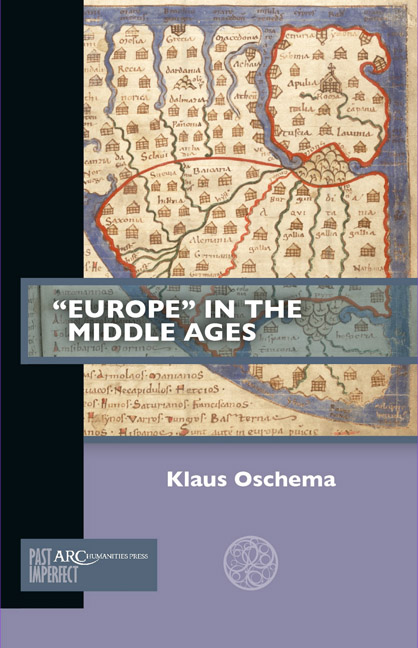Book contents
- Frontmatter
- Contents
- List of Illustrations
- Preface and Acknowledgements
- Chapter 1 Why Europe? A Concept Crossing History and Politics
- Chapter 2 Foundations in Antiquity
- Chapter 3 Moments of Transformation— Europe in the Early Middle Ages
- Chapter 4 Europe, Christianity, or Something Completely Different? Impressions from the Central Middle Ages
- Chapter 5 Our Last Hope? Entangling Europe and Christianity in the Late Middle Ages
- Chapter 6 Perspectives from Outside? Byzantium and the Arabic World
- Conclusion No Roadmap for Europe— History, Politics, and the Way to Global History
- Further Reading
Chapter 3 - Moments of Transformation— Europe in the Early Middle Ages
Published online by Cambridge University Press: 13 February 2024
- Frontmatter
- Contents
- List of Illustrations
- Preface and Acknowledgements
- Chapter 1 Why Europe? A Concept Crossing History and Politics
- Chapter 2 Foundations in Antiquity
- Chapter 3 Moments of Transformation— Europe in the Early Middle Ages
- Chapter 4 Europe, Christianity, or Something Completely Different? Impressions from the Central Middle Ages
- Chapter 5 Our Last Hope? Entangling Europe and Christianity in the Late Middle Ages
- Chapter 6 Perspectives from Outside? Byzantium and the Arabic World
- Conclusion No Roadmap for Europe— History, Politics, and the Way to Global History
- Further Reading
Summary
The ancient heritage that I sketched in the previous chapter became part and parcel of the later medieval traditions. A series of key authors, including St. Augustine, Orosius, Cassiodorus, and most importantly Isidore of Seville with his Etymologies, transmitted central aspects of this knowledge to the post-Roman world. At the same time, the slow assertion of Christianity inevitably led to significant changes in attitude towards the individual aspects that the notion of Europe evoked. While the geographical element was quite unproblematic—in fact, it fitted into the intellectual framework of a religion whose God had a tripartite nature—the mythological motifs were quite different. This chapter will first present how early Christian authors reacted to the myth of Europa, before turning to their treatment of aspects of geographical structure and administrative order. It will conclude with a brief presentation of the surprising increase of references to Europe in a religious context.
Against Paganism: Christian Reactions to the Myth of “Europa”
The important Christian thinkers of the fourth and fifth centuries were well-versed in canonical knowledge of the ancient world. St. Augustine received an excellent education in the sense of classical paideia and the same holds true for others, who also did their best to collect and transmit the canon of knowledge. Cassiodorus, who founded the monastery of Vivarium towards the mid-sixth century, organized much of this canon in his Institutiones, and Isidore of Seville's Etymologies assembled a wealth of information in quasi-encyclopaedic form in the early seventh century.
Well acquainted as they were with the traditions in “pagan” texts, we can observe how Christian authors reacted to the myths and stories they encountered. In the case of Europa, two separate strategies can be identified: On the one hand, several authors tried to rationalize the story of the abduction (as did Herodotus). Lactancius (d. ca. 320), for example, interpreted the “bull” as imagery on the sail (a tutela) of the abductors’ boat (BE 101). Most Christian authors, on the other hand, used the story of Europa's abduction to demonstrate the moral inferiority of the pagan gods.
- Type
- Chapter
- Information
- 'Europe' in the Middle Ages , pp. 23 - 32Publisher: Amsterdam University PressPrint publication year: 2023

